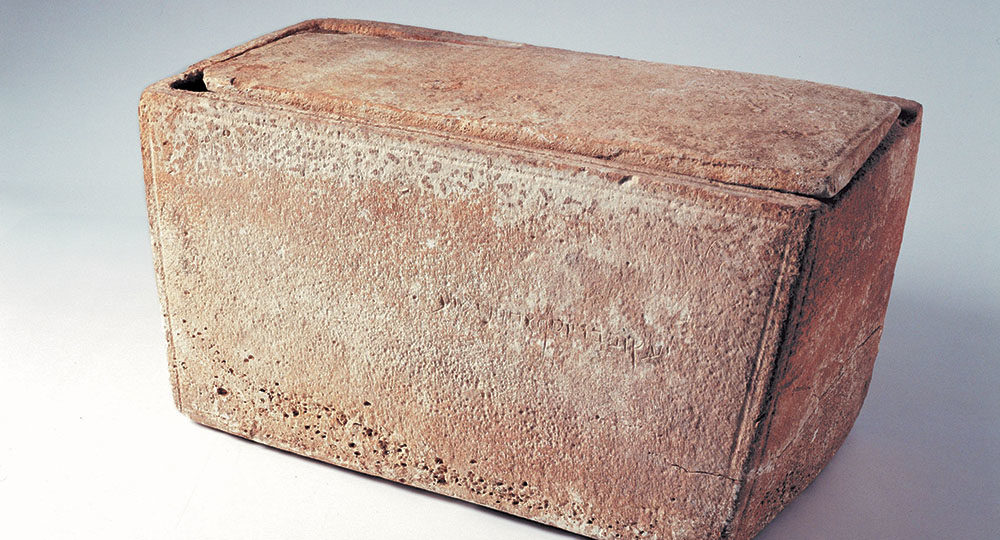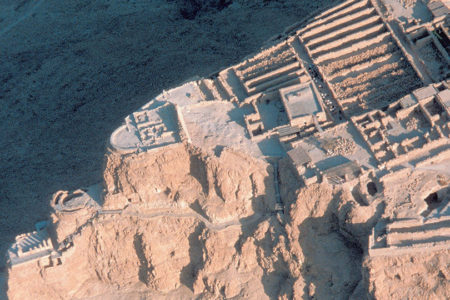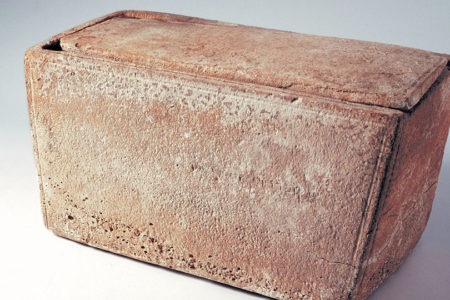The Sweetest Name I Know
A fascinating discovery was made in Jerusalem recently. In a “chance find,” a 20-inch-long limestone bone box called an ossuary was found. It once contained the bones of James, whose Epistle is in the New Testament. Even more extraordinary was the name that appeared on one of the outer sides of the box. An incision in clear Aramaic letters dating back to A.D. 63 read, “James, son of Joseph, brother of Yeshua.”
Scholars believe this ossuary is the earliest archaeological testimony for the person and name of Jesus. And, as names are the opening words to life stories, the name Jesus is no different. It reveals much about the Second Person of the triune God of Israel.
A Sovereign Name
“I am come in my Father’s name” (Jn. 5:43).
“I have manifested thy name unto the men” (Jn. 17:6).
An important point about a name is identity. A name tells you who a person is. It is unfortunate that there is so much debate about Jesus. The range of thought, in fact, runs from ideas that He was a moralist to the bizarre notion that He was an individual who struggled with “low fantasies.” Yet the truth is found in His name.
When Moses stood before the burning bush and asked God His name, The Lord replied, “I AM THAT I AM” (Ex. 3:14). The “I Am” in Hebrew relates to the personal name of God as represented by the four letters YHV(OR)H, commonly referred to as the Tetragrammaton. Jesus’ Hebrew name, Yeshua, is composed of the same four letters. And God does nothing by accident.
Yahweh of the Old Testament is Yeshua of the New Testament: “Jesus said unto them, Verily, verily, I say unto you, Before Abraham was, I am” (Jn. 8:58). The implication is clear. The name Jesus, which is an English transliteration of the Greek Iesous, is a supreme, sovereign name of the true and living God. And the power of that name is confirmed repeatedly in the Bible and by the works Christ did while on Earth.
Zechariah 14:9 says, “And the LORD shall be king over all the earth; in that day shall there be one LORD, and his name one.” Because of this verse, the ancient rabbis used to say that when the Lord reigns on Earth, He will be known by his one name, YHVH. It is Yeshua who will be known throughout the whole earth. For when He returns and reigns, all will call Him “KING OF KINGS, AND LORD OF LORDS” (Rev.19:16). So even now, proper expression of homage, respect, and adoration should be shown to the sovereign name Jesus. As Scripture declares, “At the name of Jesus every knee should bow” (Phil. 2:10).
A Saving Name
But these are written, that ye might believe that Jesus is the Christ, the Son of God; and that believing ye might have life through his name (Jn. 20:31).
The name Yeshua involves a Hebrew verb that means to “save or help” and signifies that the “Lord saves” or that the “Lord is help and deliverance.” When the Hebrew suffix for my, thy, or his is added to the name, Yeshua then conveys the full meaning of the “Lord is my salvation” or the “Lord is my help and deliverer.”
It has been reported that during the time of Christ, one out of ten people had the name Yeshua. However, only one ever claimed to be God (Jn. 5:18; 8:58) and bore the name to accomplish the very thing His name meant—salvation.
Prior to Jesus’ birth, an angel told Joseph that his intended wife, Mary, still a virgin, would bear a son who must be named Jesus because the child was destined to save his people from their sins (Mt.1:21). In those days, salvation from sin involved blood sacrifice at the Temple in Jerusalem. Yet the entire sacrificial system foreshadowed what was anticipated when Messiah would become the final blood sacrifice for sin (Isaiah 53:4–6).
In the midst of blessing his sons from his deathbed, the ancient patriarch Jacob earnestly exclaimed, “I have waited for thy salvation [Hebrew, Yeshua], O LORD” (Gen.49:18). Aged Simeon, who daily waited for the consolation of Israel, was at the Temple when Jesus was brought there at eight days of age. Simeon lifted the infant up in his arms and said, “Lord, now lettest thou thy servant depart in peace, according to thy word; For mine eyes have seen thy salvation [Yeshua/Jesus]” (Lk. 2:29-30).
Jesus embodies and personifies God’s redemption story. In Him alone and in the power of His name are sinners saved and eternally secured because “neither is there salvation in any other; for there is no other name under heaven given among men, whereby we must be saved” (Acts 4:12). Jesus is a saving name for all the world.
A Sure and Satisfying Name
The teachings of Scripture all culminate in the magnificent name of Jesus—a steadfast name that is sure and satisfying. The ancient rabbis viewed the Hebrew alphabet as sacred and full of wisdom. To them each letter radiated symbolism and meaning for life and thought. Devotionally, it is interesting to examine what “sacred mystery” the rabbis ascribed to each of the four Hebrew letters in the name Yeshua.
According to the rabbis, the first letter, yod, symbolizes humility because it is the smallest of all the letters. The second letter, shin, stands high among the sacred letters because it represents two names for God, Almighty (El Shaddai) and Peace (Shalom). The third letter is vav. It represents redemption (usually the Passover imagery) through anguish. And the fourth letter is ayin. It symbolizes a spring of water, as in Genesis 16:7.
All these symbolisms have full expression in the person and work of the God/man whose Hebrew name is Yeshua. Yod relates to Jesus’ Incarnation. Scripture states, “And, being found in fashion as a man, he humbled himself and became obedient unto death, even the death of the cross” (Phil. 2:8). Yeshua is God’s earthly name related to His great purpose in coming in humility as a servant of men.
Shin points to the fact that Jesus is Almighty God: “For unto us a child is born…and his name shall be called Wonderful, Counselor, The Mighty God, The Everlasting Father, The Prince of Peace” (Isa. 9:6). He also is our peace, who, by His shed blood, removed the barrier that separates man from God and Jews from Gentiles: “For he is our peace, who hath made both [Jew and Gentile] one, and hath broken down the middle wall of partition between us” (Eph. 2:14).
The third letter is vav. The former Pharisee Paul said under inspiration, “Christ, our passover, is sacrificed [violently slain] for us” (1 Cor. 5:7). Redemption from sin has come to us through the anguish of His suffering, death, and majestic resurrection.
The fourth and final letter in the name Yeshua is ayin. During His final celebration of the Feast of Tabernacles in Jerusalem, Jesus “stood and cried out, saying, If any man thirst, let him come unto me, and drink. He that believeth on me, as the scripture hath said, out of his heart shall flow rivers of living water” (Jn. 7:37–38). Indeed, He is the true source of living water. And anyone who comes to Him will be eternally satisfied.
To other great names the world may stand and applaud. But it will kneel and bow in worship to the name that is above all other names— the incomparable name of Jesus.
In a grave in Gainesville, Georgia, rests the body of Rev. Luther B. Bridgers. Like James, whose bones were once in an ossuary in Jerusalem, Rev. Bridgers is with the Lord. In 1910 he gave the world a beautiful hymn titled “He Keeps Me Singing.” And Rev. Bridgers probably still sings the song today—a tribute to the wonderful name of Jesus. Here is the familiar chorus:
Jesus, Jesus, Jesus,
Sweetest name I know,
Fills my every longing,
Keeps me singing as I go.






